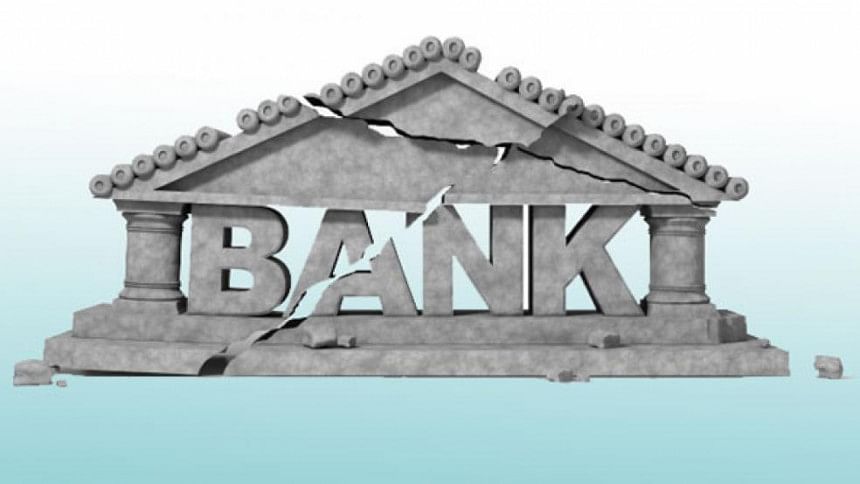Too big to fail - Too small to prosper

Remember the time when Tk. 17 crores were stolen from the vault of Sonali Bank in Kishoreganj in January 2014 just by digging a 100 yards long tunnel? Remember that time when a multilevel marketing company stole millions from people by taking advantage of their trust? Couple of our loan stories can turn anyone into a prolific fiction writer. The plots of our loan stories have also peaked enough to qualify to be considered for a Booker nomination. Even I could attempt to pen a novel at this point of time.
In our country, the banking sector looks for Oscar-level self-promoters. Just like Trump. Charmed by his performance, banks loaned Trump billions of dollars with which he bought his whole life including his yacht, hotel, airline shuttle, et al. Just like Trump, many businessmen lie about their wealth and create their own myths and perceptions of being wealthy. And at the other end, banks also often tend to trust businessmen who show up with figures of huge figures of cash and cash equivalents without disclosing liabilities. Just like Trump did in April 1990 when his accounting firm displayed his documents of $400 million in cash and its equivalents helping Trump to negotiate his lifeline. This is what many visible "successful" businesspeople do: negotiate, over pledge and under deliver. In the process, the perception of wealth is created and the job is done. After all, what more would you need apart from a few business or first class trips abroad, along with a few flashy cars and a post-modern apartment to establish the perception of wealth. On top of that, if a few art pieces are added, that seals the deal. One not only looks rich, but one also comes off as cultured. That the display of "wealth" is the business community's Achilles' heel is unknown to many.
At our end, the ground reality is truly painful. The collapse of the top ten clients of our banks can endanger the entire banking sector. Default loans have reached a staggering number of Tk. 60,000 crore, excluding the bad debts, which have been written off by the banks. The banks, in turn are in a soup, as they are failing to fully comply with their loan loss provision, as the total asset of the ten top defaulters does not add up to secure the loans that the banks have given them.
Out of the 56 banks in the country, 23 banks offer the opportunity to reschedule loans. Out of this, there are 17 which are private, 5 nationalised, and 1 foreign. The private banks have given the highest advantage of rescheduling up to 73.8 percent loans whereas the nationalised banks have kept the figure to 26.2 percent. Private banks have 6.09 percent defaulters in their bag, while the nationalised banks have 21.84 percent and the foreign banks 8.75 percent.
Those who are "too big to fail", have rescheduled their loans, technically restructured their credits, and have taken grace period. Businesses having more than Tk. 500 crores of debt have been given extensions topped by a grace period of a year, and out of 45 such applications, 11 groups of industries have rescheduled their debt of Tk. 14,658 crores. If this was not restructured, their names would have been included in list of the Credit Information Bureau of the Bangladesh Bank. As of date, only three companies have been identified defaulting loans more than Tk. 500 crores. According to CIB reports, 56 companies have not even paid a single taka against a total loan amount of Tk. 9,149 crores. 12 more companies have further taken loans amounting to Tk. 4,166 crores and have just paid back Tk. 1,625 crores. At a glance, top loan defaulters have put 10 commercial banks in peril. Only two companies out of the top ten defaulters officially have Tk. 33,000 crores of credit. And this does not even include the block loans.
A recent report of Bangladesh Bank reveals that the private banks are hostage to 50 top defaulters who owe the banks Tk. 4,732.57 crores. At the same time, the Dhaka Stock Exchange reports that the paid up capital of these companies totals only Tk. 2,821 crores as opposed to their total loan of Tk. 9,058 crores, which makes the debt equity ratio 77:23, impacting the financial leverage of these companies.
With Sonali and Hallmark scandal of almost Tk. 4,500 crores, with Basic Bank struggling with another Tk. 2,000 crores, with Bismillah Group siphoning another Tk. 1,200 crores, the scams have taken another turn. Many defaulters have exerted their influence and have filed writs, which are not allowing banks to settle these cases. According to the Central Bank, 4,250 writs are blocking Tk. 45,135 crores worth of settlement. Talk about justice and here we are . . .
Ironically, access to loans is most restricted to people who really need it, who could actually use it and who possibly have the best intent to pay it back. Very recently, we surveyed a few hundred workers and discovered that they take loans from various sources at 15-25 percent. The loan sizes are small. They are anywhere in between Tk. 50,000 to 100,000. They often avail these loans for their children's education or for household amenities, including refrigerator, television, etc. That was a moment to step back and relook at our entire financing scene. While we take loans for setting up new businesses and then re-negotiate our terms and conditions along with an advantageous repayment schedule, the bottom rung of our pyramid, which supports us, has trouble surviving in a financially hostile environment.
The writer is Managing Director, Mohammadi Group.

 For all latest news, follow The Daily Star's Google News channel.
For all latest news, follow The Daily Star's Google News channel. 



Comments